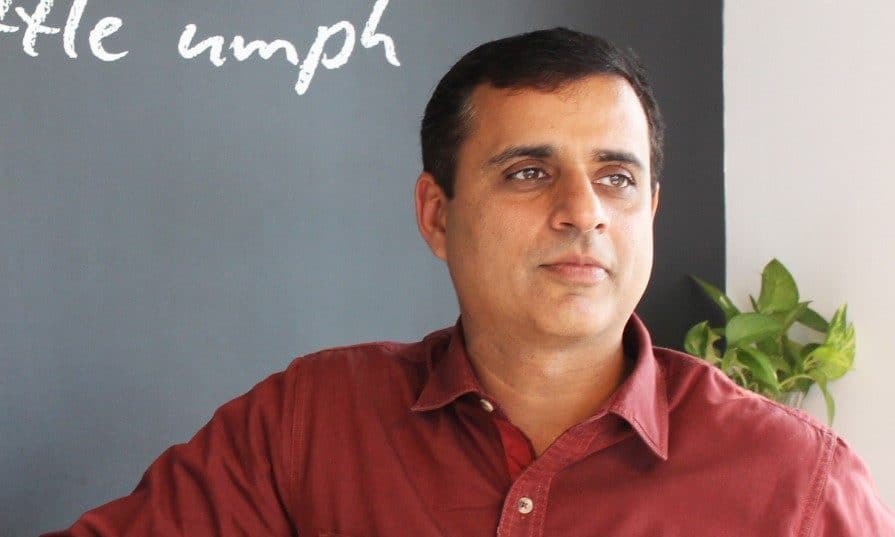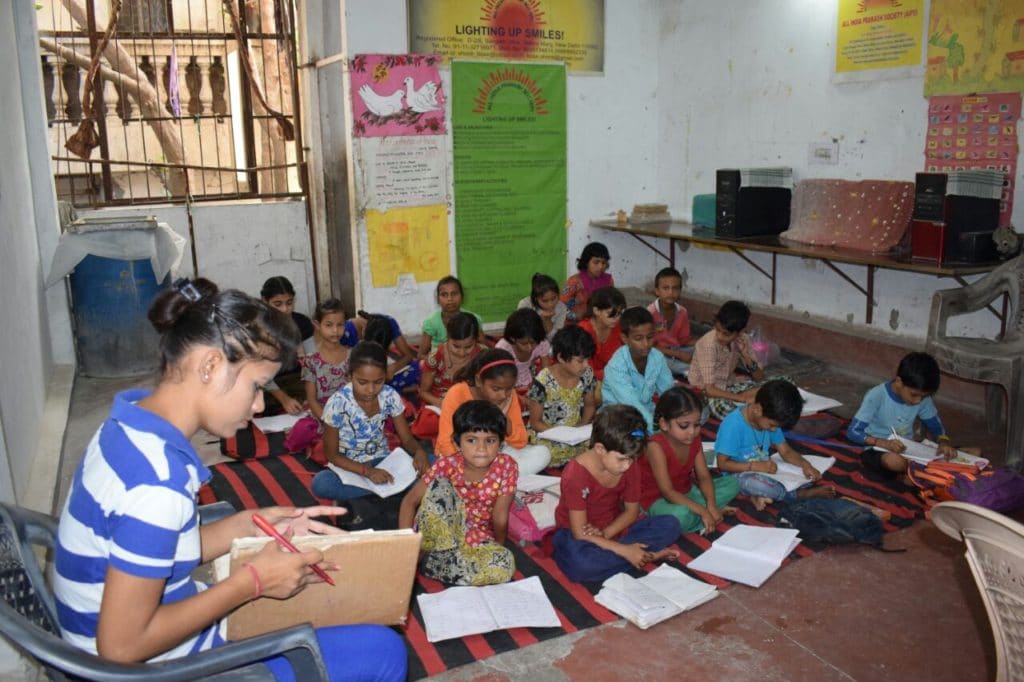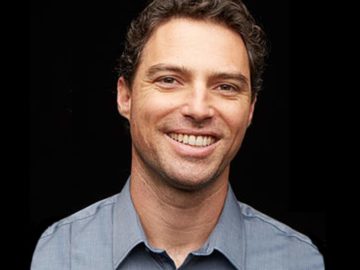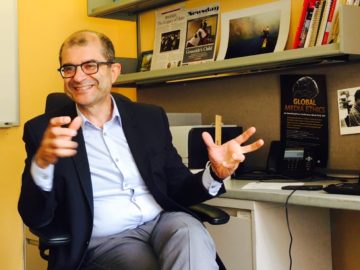
Sameer Walia: For-Profit, For People
BY PAKSY PLACKIS-CHENG
Sameer Walia is the co-founder and Managing Director of The Smart Cube, a for-profit research and analytics firm serving clients ranging from skin care brand Elizabeth Arden to turnaround consulting firm Conway MacKenzie. The Smart Cube was founded to bridge the gap between data-rich, insight-poor research firms and valuable, but expensive, advisory firms. He’s also a fellow of the Aspen Global Leadership Network, a group of entrepreneurs, both non-profit and for-profit, using their resources to address today’s societal issues.
While most entrepreneurs would be strapped in to building and running a global company, Sameer Walia finds time, talent, and treasure to serve the well-being and education of hundreds of children in Delhi, using the financial profit and human resources of his business to give back to the community. He speaks to us about the source of passion, what entrepreneurs can do to make a difference, and the disease of perfectionism.
One of impactmania’s past interviewees shares how much the media adds to polarization. Gossip and rumor are taken as news. The Smart Cube conducts extensive research in various fields. Maybe you have some insight for us?
Yes, there is a very scientific reason for what we’ve seen. It has to do with the way in which we have started absorbing information and facts for the last fifteen years.
News used to be only absorbed in physical newspapers, which you would pore over and you would treasure. Because of the fact that we’re multitasking all the time; you might be reading the New York Times on your phone, while you’re actually trying to make the pasta, and at the same time, making sure that the dog is fed.
It sounds unbelievable but, the average attention span of an individual in their 20s and 30s has now dropped to ten seconds.
Let’s say, 20 years back, you would read the New York Times over an hour. Then absorb the news, process it, and think about it. If the attention span is 10 seconds, none of that is happening. Believing what you’re reading is the gospel truth.
Not because you’re hardwired to do so, but because you need to move on to the next thing. And the next and the next and the next. Before you know it, you’ve just taken the sound bites at face value.
There are individuals who are highly analytical, but the vast majority will treat everything stated by the media with a lot of credence.
Then, you have some websites, which spew ongoing venom. The very nature of media is transformed, because of the media outlets’ intentions and the diminishing attention spans of the viewers or readers. So, it’s just a toxic combination of things.
What can people do about this? Everybody’s busy; attention span is not going to increase.
Individuals are trying to move the needle and come up with alternative media, which give you unfiltered news, meaning that you can form your opinion. Which can be done if you are really willing to make that contribution.
It’s making people stop in their tracks and realize that there is a lot of good out there. Everybody is involved in media. If you are on Facebook, and you put up 20 things, and 6000 people read it, are you not acting as a media channel?
You could call it the democratization of media. But it’s extremely powerful. I happened to read a magnet, the ones that you put on the refrigerator. It was supposed to be facetious, but it really set me thinking. It said, “It’s true. I read it on Facebook.”
The younger generation goes to news aggregators. At the average age of 26 years old — across China, Romania, India, Chicago, U.K., Germany, and Switzerland — they are absorbing all news on Twitter, Facebook, and Instagram.
What can we do? We can bring out the logical, the rational, and the good that exists in every situation. If it weren’t for the fact that we are actually living in a good society, it would have its bellows, its negativity. It has everything, which gets highlighted, but it is a good society and there are good people. Across the spectrum, across religious, social, cultural, and political divides.
We don’t even consider that anymore because things are getting more partisan. They are in some ways becoming more and more tribal.
What has been a surprising learning co-founding The Smart Cube?
The biggest surprise for me is that entrepreneurship makes you a hard person.
A supposed success is based on certain financial parameters, which are usually driven by hard decisions. You have to become immune to the soft side of human beings.
You have to make a decision: Which is the lesser of the two evils? You got two imperfect solutions and you have to run with the lesser imperfect solution.
Give me an example.
Let’s say, one is trying to retain a high performing employee who is leaving a top position.
You’ve used all the levers that one would use trying to retain the individual. Offering higher pay, changing the rules, all kinds of promises. One ends up using emotional tactics; try to paint a story about the future, which may or may not actually translate into reality.
You are trying to convince someone to change the course of a career decision in your favor by painting a story. This is treated as such a common practice that one doesn’t think and stop and reflect.
You have had the company involved in giving back before this even became fashionable. What spurred all of this?
My grandmother. [Laughs.] When I was growing up, my grandmother ingrained in me that you could always take a part of what you have at any given point and share it with the ones less fortunate.
In 2003, when we were building the company, I felt that we didn’t have to be a million-dollar company to start giving back to the world we live in.
The trigger was my grandmother. But if you are living in India, where the magnitude of inequality is not just preposterous, it’s so in your face.
I’ve been really impacted by all of that. To the extent that one has had these moments of conflict and confusion. Then coming to the conclusion that the best way of doing something is to remain in the for-profit sector and do something out there.
A year ago or so, President Obama got a lot of flak for it, for the fact that businesses do gain from what the government is doing, the infrastructure and health care. We cannot possibly take all these gigantic problems and wish for the government to take care of them alone. We have to make a contribution, and even if you make the smallest of contributions, whether monetary or physical resources, it is better than the noblest of thoughts.
Then I also realized, once business started growing, I could channel the power of the individuals in the company.
If there are 200 employees, and I could get 100 of them to come with me and plant 5,000 trees; you exercise your leadership capabilities, send your message, have people buy into it, inspire them to say, even on a weekend, “Come out, and let’s go clean the river.” Sometimes folks are disheartened; what can one individual do? But when you appeal to the good nature of man, miracles can happen.
Did it take a lot of convincing your coworkers or even maybe the co-founders to start giving back so early in the company’s lifecycle?
There has only been encouragement all around. It’s nice to show that we can do a good job for our clients but also show the other side of the world that we live in and what we can do out there.
You can show the very bright engineers working for us making very good money at ages 24 – 25 that two pizzas can sponsor the education of a girl in the slums for six months.
Tell me a bit about your involvement in the Aspen Global Leadership Network?
If I am going to continue to run a for-profit, then what about the very deep passionate yearning to do something for a social cause?
Can I be a catalyst? Can I ride in the wake of that I’m a part of? Those were the questions I asked and things sort of happened.
By being an Aspen Global Fellow, one can influence and direct change at a phenomenal level. The Global Fellowship has about 2,000 members, whom have reached a certain point of success in their lives. Success not necessarily being measured in financial terms.
Individuals who have achieved a certain degree of success, and are now asking, “How can I use my success to make a larger impact?”
That’s what resonated well with me, saying that, “Okay, I figured out what it takes to be able to achieve success in a venture. Can I use the same tool kit for something larger on the social plane?”
In India, rape is a very big issue. Can I stand on the streets and prevent rape? No, I cannot. But, can I, using my resources, my toolkit, and the ability to stand in front of 200 people, talk, motivate, and inspire them to do something?
I motivate my staff to deliver to clients so we can generate revenue and some nice profits. Then can I do something similar with the same tools for a campaign to provide street lighting in the slums of Delhi? Because when it’s dark the incidents of rape are far higher than in the parts that actually have streetlights.
How can I use access to resources to do something on a much larger scale to be able to make an impact? The Aspen fellows that we have here are looking at the adolescent girl, one of the most vulnerable parts of the society.
In the fellowship we have individuals who can within four weeks, let’s say, get a closed door, 15-minute session with the prime minister of the country. Together we can move the needle on these issues.
Give me an example of what you’ve done to make an impact?
I was inspired by the entire fellowship to look at the social venture. In big cities, like Delhi, Mumbai, or Bangalore, we have a very large section of underprivileged living in slums.
One of the largest slums in the country is an urban sprawl with no sanitation, drainage, or piped water. There are thousands of people, likely some refugees who came from Bangladesh a couple of decades back. Their children don’t even go to the state sponsored schools.
They’re the age of anything from four to 12. They help their parents in sorting newspaper and other paper. Each child helps make one dollar a day. They are able to find food and sort of fend for themselves.
The parents want them to go to school, but if they were to go to school the family would have their income slashed by 66 percent.
I identified a social worker willing to take on the challenge. We set up an informal education center. We told the parents, “If you send a child for two hours a day, they will learn the alphabet, the numbers, and they’ll get to dance a little bit…I know that you will lose out on a few hours of income, but they will get a very healthy, nutritious meal.” We used a meal as a means to attract them.

The education center run by All India Prakash Society. Sameer Walia initiated and funded two key programs, “Koshish” and “Kabari Basti Project”. Loosely translated: ‘effort’ and “ragpickers settlement project”, respectively.
The last few years, we managed to not just get about 200 to 250 kids into that center, but we’ve also managed to take some of those kids, about 60 to 70 of them, and put them into a formal school.
Because the parents are now saying, “Well, I would love to see my child wearing a school uniform, going to school, getting educated, and getting out of the cycle of poverty.” The transformation is not only of the child, but it is also of the parent. That’s the first step.
Sameer, congratulations — that’s wonderful.
Thank you. All the work is really done by the social worker, the lady who is running the center. I support her in very different ways. Sometimes that support is not just financial in nature, but by providing input. What I also found helpful is just telling them, “Listen, we are behind you.”
Honestly, the living conditions in that slum are simply inhuman. Any normal human being cannot stay in the surroundings for more than about four or five hours. You feel nauseated.
We’ve started an informal center in those surroundings, run it, financed it, and resourced it. And everything is local; it’s all from that area.
My dream is that once the children finish school, they go into college, and then they can get a job. I’d like to break that cycle of poverty.
Many people are talking about change, but when time passes by often it’s the same situation, right? It’s very hard to break that cycle. People mean well, but in the end, many programs often do not make a real difference.
This gives me a platform to scale this up. So can I impact not 250 but 250,000 kids? That’s the ambition.
How do you scale something like that up?
Primarily resources, it’s not just monetary, but it requires time, it requires resources. I’ll be honest; it requires me to step out of what I’m doing currently.
What do you think is needed for social impact?
It is passion and commitment. ‘Till you don’t cry thinking about the world, you don’t reach that point of passion. I call it the passion index.
It goes back to the role the media…when you see hospitals being bombed and human misery so often, you get immune to it.
Three years back I was in Israel and spending time in Palestine. I met with a 26-year air force pilot, who during that time flew over Gaza.
He comes home in the evening and cries. He’ll go to sleep, then cry for hours. He started writing, as a release. He started singing because, “I don’t wanna get up in the morning and kill more people.”
What does it require for us to move from one extremity of the spectrum, which is “I am becoming cold and getting on with my life” to saying “I’m so passionate about gender inequality that I am moved to tears.” Because when you reach that point you’ll say, “Well, now what can I do about it?”
What steps can you provide to fellow entrepreneurs who are busy with building their companies and living their lives? What would be one simple step that people can take?
The easiest and the most effective way for fellow entrepreneurs to contribute is to write a check.
The opportunities and resources entrepreneurs have at hand are surely the most enormous that have been in the last centuries.
We’ve always had entrepreneurs, but large corporations, such as GE, ABB, Johnson & Johnson, and Walmart have much less power than the entrepreneurial energy from Google, Facebook, and Uber.
If you look at the entrepreneurial energy that exists in the developing world, including China and India, the level of entrepreneur capability and resources can be used for social impact. That’s what it takes. Because we need people to come up with ideas about how we can eradicate some of the most threatening diseases across the globe. People with ideas, people who can get things done, and can get resources.
What’s next for you?
Getting through the U.S. election. [Laughs.]
Really? Good luck with that, you and so many other people. At least there’s real passion there!
[Laughs.] Yeah, I have a bit of an obsessive-compulsive disorder about following the election. I’m just very curious what Donald Trump tweeted at three in the morning.
It’s not an election anymore; it’s just entertainment at this point.
I am being facetious, but with Brexit, people were saying: “It is not happening. It can’t happen” And it happened. I hope the same isn’t going happened in the U.S. elections.
Give me a word that describes your journey so far.
Learning.
I was a perfectionist. I learned that it’s a disease; being a perfectionist was absolutely unhealthy for people around me. Perfectionism may be a disease, but one can strive for excellence.
I’ve learned a lot about how my decision-making sometimes has certain biases built in it. It’s only when you look back when you realize the confirmation-bias, I have decided that something is the right thing to do and I will look for six things to justify it. [Laughs.]
I could write a book on my learnings! [Laughs.]




